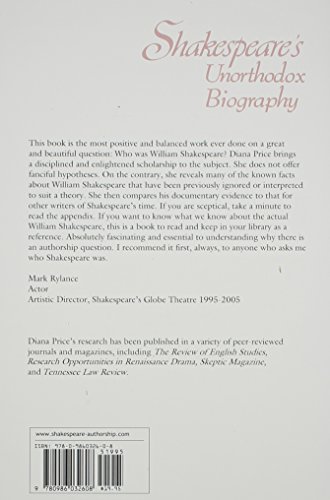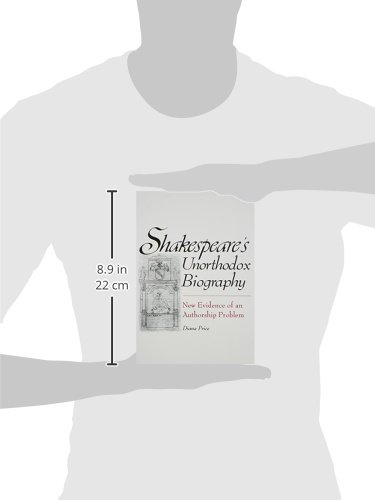



Full description not available
C**E
Strong Argument Which Lays Out the Problem of the "Typical" Shakespeare Biography and How It May Be a Myth
Ask a typical English-speaker, be they English/British, Australian, Canadian, or American, who is considered to be the greatest writer of the English language? Invariably you'll receive the answer "William Shakespeare" even among those who have never attended one of his theatrical plays. And yet, among all the greatest writers of English, he seems to be the most enigmatic. Most of his biography concerns dealing in property and grain. No evidence survives indicating that he had anything to do with poetry, acting, or playwriting until his arrival in London circa 1591-2. The earliest surviving evidence of his being involved in theater is a pamphlet called "Groatsworth of Wit" warning other playwrights of an "upstart crow...his owne conceit the onely Shake-scene in a country." The facts about Shakespeare's life have a lot of holes, but as Price puts out, more holes than many other writers of the same era in terms of primary sources about his literary activities, not his business dealings.Price sets out to examine the conventional Shakespeare biography and show how biographers have either misunderstood or even misrepresented the life of the man from Stratford who has been bequeathed with that ominous title of being the greatest writer of the English language who ever lived, somewhat similar to the composer J.S. Bach in music. People not familiar with the Shakespearean scholarship are often shocked to find out that neither play, sonnet nor letter written in the hand of the man from Stratford exists. Only one undelivered letter to him survives. Prior to 1592, we have no evidence of him engaging in acting, playwriting, or any kind of writing. Then supposedly he comes to London and becomes the greatest playwright and poet the world has ever seen. He is listed in the list of players in the Lord Chamberlain's Men, one of the companies which performed Shakespeare plays, and he is listed as a shareholder of the London Globe Theater.Just 10 years later, in 1602, he returns to Stratford. There are records of him dealing in grain and property but no records of him engaging in writing or theater. So, a full-time businessman supposedly enters into an acting company out of nowhere, is accepted by the Acting Guild, writes the greatest plays ever written in English, and then returns to Stratford and continues his business dealings as a trader in grain and property. His plays are published in quarto and he doesn't seem to care. Yet we have documented evidence that he was often hounding his debtors for payment, sometimes taking them to the equivalent of small claims court. There's even a document where a tax collector couldn't find him. But he seems uninterested in receiving payment for the publications of these glorious plays.In 1616, the man from Stratford dies, and his Will, which appears to be written by a lawyer, makes no mention of any books, plays, or even shares in a London theater. He seems to be a very ordinary middle-class businessman. Then in 1623, the so-called Shakespeare First Folio is published and the author seems to be credited to the man from Stratford. But where is the evidence that Stratford wrote plays? That someone saw him and commented about his playwriting? That he even attended his own performances, aside from simply being in a list of actors? Or was this man pressed into service to front for another playwright, as yet unnamed, who was the actual mind and spirit behind the plays? Price's biography is not so much a biography as a critique of the evidence and shows how weak the evidence to support the man from Stratford as being the true William Shakespeare. She shows how the evidence has been often skewed and even distorted to fit the biography of a man who seems from the outset very unlikely to have written the plays as by William Shakespeare. In short, her conclusion is that the Stratford story may be no more than an historical myth. She doesn't offer any candidate as the true Shakespeare, but does appear convinced the writer was a nobleman.
S**Y
A fascinating read
First of all, you should get the paperback version--it includes updates since the original printing. Furthermore, the author has a website devoted to this subject. You can find it easily.I've followed the authorship controversy off and on over the years, but only came across Price's book recently. It is a refreshing change from some of the highly emotional and at times eccentric theories built up around this thing. By not proposing a candidate for author, by merely sticking to an examination of the Stratford man's life as documented, the effect is simply devastating, and rather elegant. I'm no longer on the fence. I don't know who wrote the plays, but I know who surely did not.It's a relief, as well, to get away from those grand conspiracy theories. It is enough to understand the stigma that attached to an aristocrat writing works that would be perceived as commercial. The first folio and Jonson's dedication appear to have been an attempt to collect and to save the work for posterity, while sparing the annonymous author's reputation and respecting the privacy and pride of his survivors.Price is restrained and logical in her examination of the documentary evidence pertaining to the plays and to the Stratford man. To my mind her approach is highly embarrassing to most of the so-called scholars who have worked this ground. Instead of accepting what others have done, she tries to take a fresh look. (I love where she quotes one of the more realistic biographers of Shakespeare, who stated that any biography of the man must of necessity be 5% substance and 95% padding, or if you like, mythologizing-- he must have this, he might have that.)Price basically takes a hard look at that 5%, and nothing but. Which leads to a sorting of facts that leaves us with three categories: facts related to the Stratford man (not at all flattering, and never literary, though often pointing to semi-literacy), facts related to the pen name Shake-Speare or Shakespeare, that appeared on title pages, and last, and thinnest, the shadowy author of the works, who most certainly was not from the peasant or middle class, and whose need for privacy was served by allowing the Stratford man to be taken for the author, which originally may have been unintended. The evidence in this third category resides in the works themselves. They were written by a person or persons who unconsciously spoke a language derived from the life of the Elizabethan nobility. And of a seasoned lawyer. It is simply, as it were, in the DNA of the plays and sonnets.When you see the evidence laid out this way, you actually start to feel sorry for the orthodox scholars. Over the centuries, they never really had the chance to approach it this way. They came to Shakespeare biography from the opposite side: starting with the assumption that we know who the author was, and then having to make the documentary evidence fit that story. And that's how we got that other, disastrous, 95%.People like Price must be doing something right--I saw in the news recently that a posse of the Orthodox got together to put out a definitive, Stratfordian rebuttal in book form. When they resort to ganging up like schoolyard bullies, they must be worried.But I can't help wondering just who or what they are defending. And it's not snobbery to say this. Personally, it rather irks me to think the author had to be an aristo. In my bones I prefer good old Bill Shakespeare the rail splitter and genius from Stratford. But no such fellow ever existed, except in our democratic fantasies.On the back cover of the paperback edition it describes Price as an "independent scholar". What does that make the majority? "captive scholars"? How apt. And Einstein worked in the Patent Office.Note: If you have a Kindle you can also download Mark Twain's "Is Shakespeare Dead?" from Amazon (it's free). Also highly enjoyable.
K**A
All about Will Shakspere from Stratford, and why many doubt he wrote the works of Shakespeare.
I say: read it.If you believe William Shakspere from Stratford wrote the works of William Shakespeare, this book will explain why anti-Stratfordians exists.If you don't believe William Shakspere from Stratford wrote the works of William Shakespeare, this book is the perfect handbook, collecting and discussing all surviving traces of Mr Shakspere and why it isn't enough to prove authorship.If you are curious about Shakespeare or want to know more about the Authorship question, this book will show you what we know about William Shakspere from Stratford and in a open and honest way discuss the facts and how scholars argue about it. It will also show you how little we know, and how much effort and research that has been done to find the final, indisputable evidence about the authorship of the works of William Shakespeare.The vast amount of knowledge and research and reasoning gathered in this book makes it inevitable that some passages and arguments in the book gets repeated, and the composition a bit loose at times. But always, the book is interesting and easy to follow.Diana Price don't believe William Shakspere from Stratford is the true author. I find her reasoning sharp, and her discussions honest and balanced. Even though the books conclusion is clear, I don't feel pushed to believe that it is the final truth. I like that very much!
W**S
Perfect Condition; OnTime
The book is very good. It arrived in perfect condition and right on time.
C**E
FLAT EARTHERS AVOID
Brilliant. A very well crafted exposé' of the chap from Strattford. Whether one thinks that the 17th Earl wrote the books or someone else reading this shows that there is plenty to convince that all is not as clear re the authorship of the plays and sonnets as we have been taught over the years.Reading books on this subject and the increasingly spiteful repudiations by orthodoxy gives one some idea how Galileo Galilei must have felt :-)
J**J
Once you have read this meticulously researched but yet very ...
Once you have read this meticulously researched but yet very readable book it is impossible to believe the story that William 'Shakspeare' of Stratford wrote the 'Shakespeare' plays. A must for anyone remotely interested in the Shakespeare authorship controversy.
H**L
Interesting book
Really enjoying reading this book - it's interestingYou do ask yourself, while reading this book, why have so many authors been very selective with the evidence they have found over the years?The writings of "Shakespeare" are not diminished even when we start to question who the person/s, was/were, that wrote the plays and sonnets attributed to "Shakespeare"
G**T
Have an open mind on the facts that are presented in this book.
Interesting facts on the man called Shakespeare. Certainly a convincing argument as to who wrote the plays and sonnets.
P**N
book order
Book came in perfect the great copy excellent condition , very pleased
Trustpilot
1 day ago
2 weeks ago